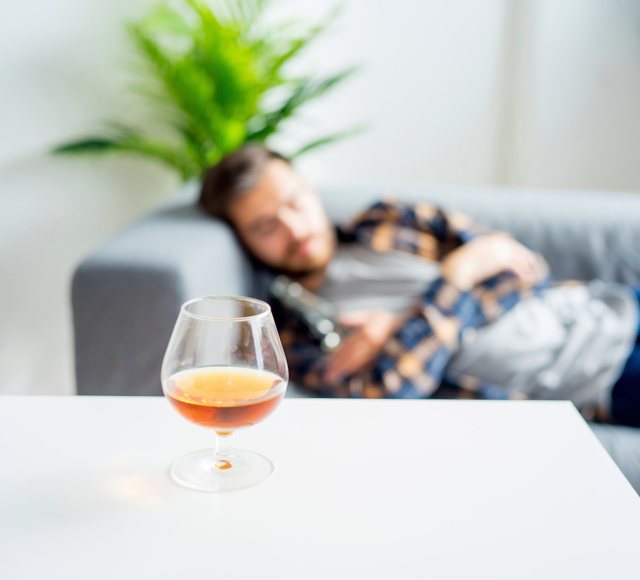Get Medical Detox Support at Ingrained’s Alcohol Detox Georgia
You (or someone you love) have decided to stop drinking for good, but now you need help for the immediate withdrawal symptoms.
Where can you or your loved one turn to find an alcohol detox center in Georgia that caters to your unique dependency issue? Ingrained offers the help you need to get sober — and stay that way!
Our medical detox support enables you to minimize withdrawal symptoms through 24/7 medical supervision and medication-assisted treatment. Your drug and alcohol detox costs may be covered by insurance. We can transition you from detox to inpatient treatment when you are ready for less restrictive care.
When you’re ready to think about tackling a substance use issue, Ingrained is here to help. Here is what you can expect from medically-supervised detox for alcohol misuse and why you should choose our drug and alcohol rehab facility to take the first steps toward sobriety.
Get Effective Treatment Programs at Ingrained Recovery

Get Help for Withdrawal Symptoms of Drug and/or Alcohol Addiction
The most pressing concern for many people struggling with drug and alcohol addiction is the first days without a drink. Withdrawal symptoms can be severe, especially if you’ve been a heavy drinker for an extended time.
Symptoms vary in their severity, but they can start as soon as eight hours after a last drink.
The most common symptoms are uncomfortable but relatively benign. They include anxiety, issues with mood, sleep disturbances, shakiness, and issues with thinking clearly.
However, there are more severe symptoms that you may experience, which is why detoxing at home can be dangerous or even fatal in some cases.
If you experience these symptoms, you may be more likely to turn to a drink, but you will be safe within our treatment program. Fortunately, there are a few things we can do to minimize these symptoms and make you more comfortable while you endure the drug detox process.
Using Medication-Assisted Treatment to Minimize Symptoms
One of the strongest tools in our arsenal that can minimize the symptoms you may experience in the early days without alcohol is medication-assisted treatment. This can be a multi-faceted approach to keep you comfortable and treat underlying conditions.
First, we can prescribe you something that helps with general withdrawal and is more effective than trying to taper off alcohol on your own.
For example, we may be able to offer medicine to help you sleep, to ease nausea and vomiting, or to break a fever. If you struggle with anxiety or mood issues, prescription drugs may be able to help.
There are also other prescription drug options for the long-term treatment of drug and alcohol addiction, including:
These prescriptions don’t create new dependency issues and are great for the long-term treatment of substance abuse. If you think you could benefit from medication management, consider enrolling in our alcohol or drug rehab centers where you can safely start medication while we monitor your progress.
Proven Programs for Clients with Dual Diagnosis Conditions
Treating substance abuse likely doesn’t happen in a vacuum. There are often underlying conditions that contribute to drug or alcohol use such as anxiety, mood disorders, and other serious mental health disorders. If you’re concerned about your mental health in the days following alcohol addiction, we offer long-term help.
Our trained counselors and medical support staff monitor you for the signs and symptoms of other mental health conditions like anxiety, depression, bipolar disorder, and schizophrenia. If we see that you’re struggling with more than alcohol use disorder, we are capable of offering robust treatment for both conditions.
This may include more medication management and intensive therapeutic intervention. Our alcohol addiction treatment center offers the comprehensive treatment you need to detox safely and establish a solid foundation for lasting recovery.

Transition to a Lower Level of Care with Our Upscale Residential Program
Once you make it through the worst of your symptoms in our alcohol detox center, we can transition you to the next level of care: residential treatment. You can reside in our luxury recovery center full-time for a longer period, usually thirty to ninety days.
During your time at our inpatient drug rehab, you will have around-the-clock access to medical support and counselors. When you aren’t ready to transition back to routines after your medically-guided detox program, this is the next step.
We will continue to treat you with intensive services including one-on-one counseling, group sessions, and complementary therapies like equine therapy. Our inpatient treatment program ensures that you’ll be quite comfortable while you learn how to live without booze and achieve successful recovery.
Get Effective Alcohol Detox and Rehab Options at Ingrained
Does Insurance Cover Alcohol Detox and Substance Abuse Care?

One of the more pressing concerns for many of our clients is whether their health insurance is going to cover their behavioral health treatment for alcohol and drug addiction. A detox is the first step of the recovery process, but nobody wants to go into debt to get the help they need.
The good news is that insurance may cover the cost of your treatment in part or in full.
Under the Affordable Care Act, substance abuse treatment is considered one of ten essential health benefits that must be covered. That doesn’t mean that they have to cover it in its entirety. Rather, they must cover it to the same extent that they would cover medical or surgical intervention.
Health insurance plans can offer coverage for several levels of care, including:
- Medical Drug Detox
- Residential Treatment
- Inpatient Drug Rehab
- Intensive Outpatient Programs (IOP)
- Partial Hospitalization Program (PHP)
Your individual insurance plan will dictate what is covered and how much you will pay out of pocket for Georgia drug and alcohol rehab. Ingrained Recovery works with several insurance providers, and can help you verify your coverage with just a quick call.
Out-of-Pocket Costs for Drug or Alcohol Addiction Treatment
How do you know what will be covered by your insurance plan? A close examination of your policy will give you a good idea of what to expect. Start by looking at your deductible, which is the amount you pay out of pocket before insurance starts to kick in.
You may also have a coinsurance payment or a percentage that you must help pay.
Private health insurance companies work out payment rates with in-network alcohol rehab centers to minimize the cost of treatment for their clients. However, that doesn’t mean that you can’t afford an out-of-network facility. You may be eligible for a sliding fee scale or payment assistance to start your addiction recovery process.
When you’re ready to get help for your withdrawal symptoms, contact our recovery advocates. In a quick and completely confidential phone call, we can verify your insurance benefits and let you know what to expect cost-wise from your recovery journey.

A Sampling of 6 Reasons Why to Choose Ingrained for Your Recovery Journey
You have an endless list of addiction treatment programs you could enroll in, so why choose to spend your recovery with us? Here are a few reasons why you should consider reaching out to Ingrained today.
1) Peaceful Setting on Fifty Acres of Land
Do you want to find a restful place to land when you’re going through alcohol or drug addiction? Our facility is one of the most serene places you could go in the beautiful hills of Georgia. When you are with us, you have access to our fifty-acre property where you can explore, go for a walk, or simply enjoy the warm Georgia sunshine.
2) Luxury Accommodations for Ultimate Comfort
Going through addiction treatment will occasionally be uncomfortable as you learn to adjust to a new way of life without drugs and alcohol. Let our facility make you as comfortable as possible with our luxurious setting. When you enroll in inpatient treatment at Ingrained, you can escape from the daily grind and focus on your recovery today.
It provides a nice break from the chaos that often accompanies home life in the aftermath of substance use disorders. Rest easy during your time with us and know that you can work on your home life piece by piece.
3) Transition to Outpatient Treatment Programs
At some point, you will no longer need residential treatment to minimize your symptoms of drug and alcohol use. Our center is invested in your long-term recovery and we aim to transition you to a lower level of care as soon as you no longer need medical detox.
We’ll start with residential and then move you to outpatient treatment like partial hospitalization when you’re ready.
Our intensive outpatient program allows you to spend several hours per day in our luxury facility, where you will receive many of the same benefits of a higher level of care. The difference is that you get the freedom and flexibility to put skills into practice. Come and go between appointments, allowing you to sleep in your bed at night while spending time with family and friends.
4) Participate in Equine Therapy as an Alternative Approach
One of the unique features of our treatment center is our equine therapy program. Horse-assisted therapy programs are proven to help clients maintain long-term sober living. Not only is it beautiful when you look out the window to see our horses grazing, but it’s also healing for clients.
Complementary therapies shouldn’t be overlooked when thinking about a treatment program. They often provide you with skills to maintain recovery for the long haul. When used in combination with individual counseling and group therapy, the result is a healthier lifestyle.
5) Same-Day Placement for Immediate Help
Once you know that you need help from an alcohol detox center, you don’t want to have to wait for a bed to open up days or weeks from now. You need assistance right away, and Ingrained Recovery is here to help.
We offer same-day placement for anyone interested in our program at Ingrained, enabling you to get help as soon as possible. Once you’re here, you get the best of our medical supervision and intervention with all the benefits of our luxury treatment facility.
6) Nutritional Guidance for Complementary Healing
It likely comes as no surprise that your nutrition will suffer while you are in the grip of alcohol use. You might forgo meals, especially healthy and lovingly prepared meals. As a result, you may have nutritional deficiencies or even malnutrition. Ingrained takes action to create a well-rounded nutritional plan for you.
We serve delicious southern-style cuisine that helps you create a well-balanced diet as you heal from substance use. In addition, we will teach you how to eat healthy again so that you can take the skills you learn from our facility into the rest of your life.
This is just one example of our commitment to holistic care. Combined with other therapies, you get the most well-rounded treatment options.
Up To 100% of Rehab Costs Covered By Insurance
Reach Out to Ingrained for Help with Alcohol Detox Today
Are you ready to get quality treatment and support for your alcohol or drug abuse? Don’t let another day go by before you start on the journey to long-term sobriety. We offer proven treatment approaches and personalized treatment plans that start with alcohol detox programs and inpatient care.
Ingrained has the services you need to achieve long-term sobriety from drinking.
Our recovery advocates are ready and waiting to answer your questions about our program, facilities, and insurance coverage. Reach out to us today to learn more about how we can help you with relapse prevention and sober living!
References
- U.S. National Library of Medicine. (n.d.). Alcohol withdrawal. MedlinePlus.
- Witkiewitz, K., Saville, K., & Hamreus, K. (2012). Acamprosate for treatment of alcohol dependence: mechanisms, efficacy, and clinical utility. Therapeutics and clinical risk management, 8, 45–53.
- Pedersen, B., Askgaard, G., Jørgensen, C., Oppedal, K., & Tønnesen, H. (2018). Disulfiram for alcohol use disorder. The Cochrane Database of Systematic Reviews, 2018(9), CD010487.
- Romach, M. K., Sellers, E. M., Somer, G. R., Landry, M., Cunningham, G. M., Jovey, R. D., McKay, C., Boislard, J., Mercier, C., Pépin, J. M., Perreault, J., Lemire, E., Baker, R. P., Campbell, W., & Ryan, D. (2002). Naltrexone in the treatment of alcohol dependence: a Canadian trial. The Canadian journal of clinical pharmacology = Journal canadien de pharmacologie clinique, 9(3), 130–136.
- Batki, S. L., Pennington, D. L., Lasher, B., Neylan, T. C., Metzler, T., Waldrop, A., Delucchi, K., & Herbst, E. (2014). Topiramate treatment of alcohol use disorder in veterans with posttraumatic stress disorder: a randomized controlled pilot trial. Alcoholism, clinical and experimental research, 38(8), 2169–2177.
- Gatti, F., Walderhaug, E., Kern-Godal, A., Lysell, J., & Arnevik, E. A. (2020). Complementary horse-assisted therapy for substance use disorders: a randomized controlled trial. Addiction science & clinical practice, 15(1), 7.
- Barve, S., Chen, S. Y., Kirpich, I., Watson, W. H., & Mcclain, C. (2017). Development, Prevention, and Treatment of Alcohol-Induced Organ Injury: The Role of Nutrition. Alcohol research : current reviews, 38(2), 289–302.

